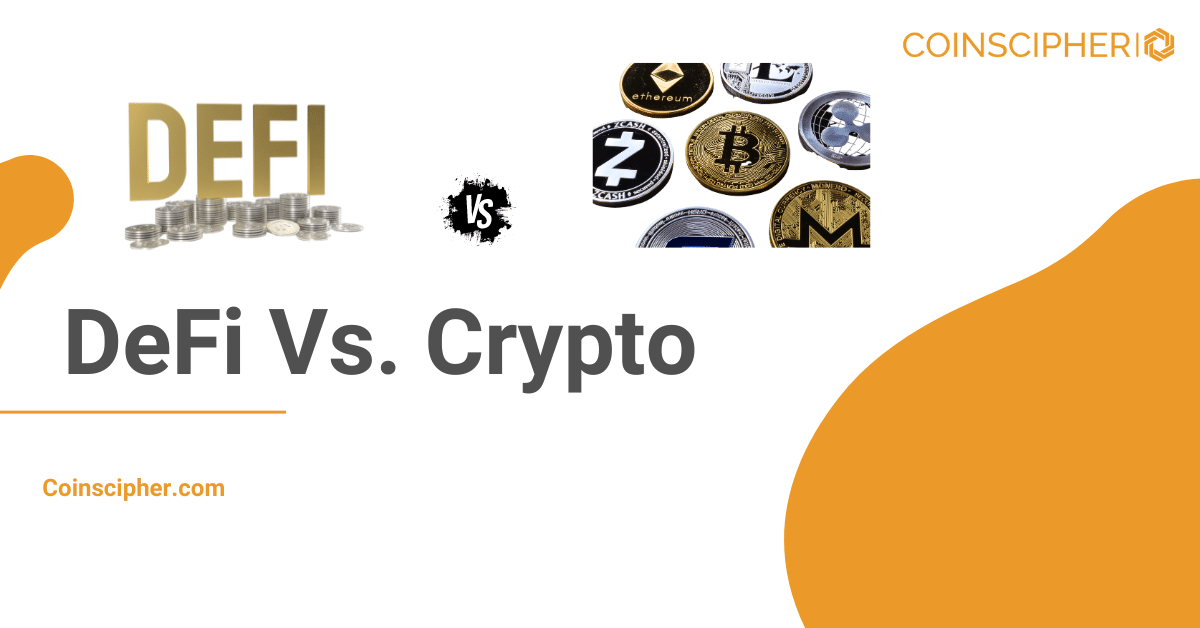In the realm of digital finance, DeFi and Crypto are two terms that often come up. Although they are related, they are not interchangeable. This article aims to offer clarity on the “DeFi vs Crypto” debate by providing a comprehensive explanation of the distinctions and similarities between these two concepts.
Are DeFi and Crypto the Same?
No, DeFi and Crypto are not the same, although they are closely related. Cryptocurrency is a type of digital asset, while DeFi is a financial system built on blockchain technology, which also powers cryptocurrencies. DeFi uses cryptocurrencies, particularly Ethereum, in its applications, but it encompasses much more than just cryptocurrencies. It includes a wide range of financial applications and services that are decentralized and operate without intermediaries.
What is Cryptocurrency?
Cryptocurrency, also known as ‘crypto’, is a form of digital or virtual currency that ensures security through cryptography. Bitcoin, the pioneering cryptocurrency, introduced blockchain technology, a decentralized system that distributes transaction management and recording across numerous computers.
What is DeFi
Decentralized Finance, or DeFi, functions as a groundbreaking financial model. It is open-source, permissionless, and transparent. DeFi operates without intermediaries like banks or brokers and relies heavily on the Ethereum blockchain.
Read More Guides On DeFi:
- Bridge Assets From BSC to Ethereum
- DeFi Gaming: What is it?
- How to Add Metis to MetaMask
- How to Bridge to Mertis?
The Relationship Between DeFi and Crypto
DeFi and Crypto are interconnected. DeFi applications are built on blockchain platforms, which serve as the foundation for cryptocurrencies. These applications utilize crypto tokens in their operations. For instance, Ethereum, a type of cryptocurrency, is commonly used in DeFi applications for transactions or as collateral.
DeFi vs Crypto: Key Differences
DeFi and Crypto have distinct roles, despite their relationship. Crypto refers to digital assets that can be utilized in online transactions. DeFi, on the other hand, is a financial system built on blockchain technology (which powers Crypto) that works towards democratizing finance by eliminating intermediaries.
In terms of their scope and interoperability, DeFi and Crypto exhibit notable distinctions. While Crypto is encompassed within the broader category of DeFi, DeFi surpasses cryptocurrencies by encompassing a wider range of financial tools and applications that are constructed on blockchain technology. DeFi applications are commonly developed on prominent blockchain platforms like Ethereum, allowing them to seamlessly interact with one another. This ability to interoperate is a crucial characteristic of DeFi. Conversely, individual cryptocurrencies typically exist independently and do not directly engage with other cryptocurrencies.
Similarities Between DeFi and Crypto
DeFi and Crypto share a common foundation in blockchain technology. Both strive to achieve decentralization in the financial sector, promoting accessibility and reducing dependence on traditional financial institutions. Additionally, both DeFi and Crypto incorporate the use of tokens to facilitate transactions within their respective systems.
DeFi and cryptocurrencies operate on the principle of decentralization, meaning they are not controlled by a central authority. This is a key feature of blockchain technology, which underpins both DeFi and cryptocurrencies. Furthermore, both DeFi and cryptocurrencies have the potential to disrupt traditional financial systems. Cryptocurrencies offer an alternative to fiat currencies, while DeFi offers decentralized versions of traditional financial services.
How DeFi is Changing the Crypto Landscape
The integration of DeFi in the crypto landscape enhances its functionality. In comparison to traditional cryptocurrencies used solely for transactions, DeFi leverages digital currencies to generate intricate financial offerings like loans, insurance, and yield farming, eliminating the requirement for intermediaries.
Popular DeFi Platforms and Their Use of Crypto
Various DeFi platforms, such as Uniswap, Compound, and Aave, are widely recognized and used in the cryptocurrency community. These platforms leverage crypto tokens like Ethereum to facilitate activities such as lending, borrowing, and earning interest.
Risks and Rewards of DeFi and Crypto
Investing in both DeFi and Crypto comes with potential risks and rewards. While they offer the potential for high returns and greater financial inclusivity, they also carry risks, including market volatility, and technological bugs.
Frequently Asked Questions
To further clarify the relationship and differences between DeFi and Crypto, let’s address some frequently asked questions:
What is the difference between DeFi and Crypto?
DeFi refers to a financial system built on blockchain technology that operates without intermediaries, while Crypto refers to digital assets used for online transactions. DeFi uses cryptocurrencies in its applications, but it includes a broader range of financial services.
Can you use Crypto in DeFi?
Yes, cryptocurrencies, particularly Ethereum, are commonly used in DeFi applications for transactions and as collateral.
Is DeFi safer than traditional banking?
DeFi eliminates the need for intermediaries, which can reduce certain risks associated with traditional banking. However, it also introduces new risks, such as smart contract bugs and the potential for fraud. Therefore, whether DeFi is safer than traditional banking depends on various factors, including the specific DeFi platform and the user’s understanding of the technology.
Can DeFi replace traditional banks?
While DeFi has the potential to disrupt traditional banking by providing decentralized financial services, it’s unlikely to completely replace traditional banks in the near future. Many people still rely on the services provided by traditional banks, and regulatory, technological, and adoption challenges remain for DeFi.




